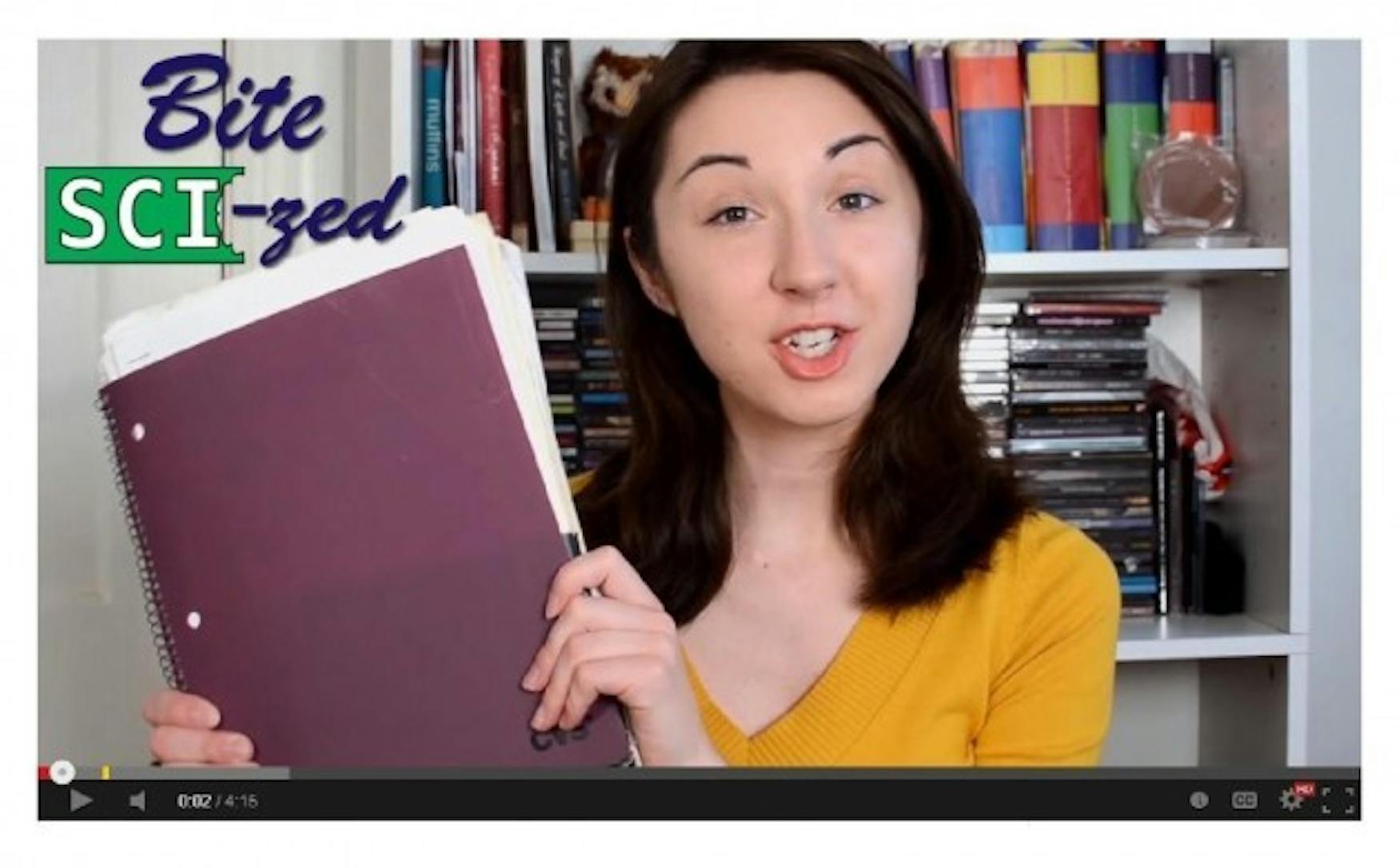Science made simple
Alex Dainis i11 produces her own science-themed YouTube series
How does caffeine give us energy? Why do we sneeze? What causes a brain freeze when we eat cold food too fast? If you've ever asked yourself these questions or wondered about the science behind parts of your day-to-day life, you may find answers on Bite Sci-zed, the YouTube channel that Alex Dainis '11 has created. In the spirit of making education available without barriers, Dainis has created a series of free science-related educational videos on her YouTube channel, Bite Sci-zed.
Like its name suggests, Bite Sci-zed provides "short, informative, informational science videos" about interesting topics that will be "open and accessible to anyone, no matter what their scientific background," Dainis said.
Bite Sci-zed currently has around 15,000 subscribers and is approaching one million channel views. Much of the videos' subject matter comes from "questions or conversations that I have with my friends," she said. For instance, "I was standing around with a bunch of co-workers who were talking about motion sickness, and I thought that was a really cool question, so I went and researched it and made a video." Other Bite Sci-zed videos are inspired by science-related current events or news stories.
A key aspect of Bite Sci-zed is that it remains a free resource. "I am really a huge believer in the fact that my videos should be free and open to everyone .... Education is not something that should be restricted to people who can pay for it, especially on the Internet," she said. "I want my videos to be open and ready to spread science to anyone with an Internet connection."
Though Bite Sci-zed is not Dainis' main focus-she just started at Stanford University, where she is pursuing a Ph.D. in genetics-it is a significant time commitment. If a video is about a subject that Dainis knows well, it may take five hours to make it. If a subject requires a lot of research, it may take Dainis up to 20 hours to create it. Dainis makes all the videos by herself and does all research on her own.
Dainis was inspired to start Bite Sci-zed partly as a result of her studies as a Brandeis undergraduate. Dainis double-majored in Biology and Film, Television, and Interactive Media. Her time as a teaching assistant at an undergraduate biology lab "led [her] to realize how much [she] loved teaching and explaining science to people," she said.
Dainis spent two years working in Prof. Paul Garrity's (BIOL) lab at Brandeis, where she "fell in love with research, which inspired [her] to go to graduate school," she said. These two unique interests combined helped her create Bite Sci-zed. After graduating from Brandeis, "I was working in film, but I missed teaching people about science," she said, "I love watching the light bulb go off while people learn. I thought I could combine the film stuff and the science and reach people all around the world."
Dainis generally tries to aim her videos towards high school or college-age students, but tries to make them accessible to people of varying levels of education. "If you have no background, you should be able to jump right in. And if you know a lot and have a much stronger background, you can still jump in," she said. To keep viewers interested, the videos are staged in a variety of different settings and incorporate many different types of visuals. A video explaining how brain freeze works, for instance, starts out in a kitchen with Dainis making a smoothie.
Audience interaction is a big part of the channel: Bite Sci-zed has been viewed in 204 countries and territories. Viewers may notice that many of the videos have subtitles in other languages. Currently, there are videos subtitled in French, Spanish, Hebrew and Russian. Dainis did not originally plan to include subtitles.
"The subtitling is actually all viewer-generated. I've had people step up and ask 'Do you mind if I subtitle?'" she said.
The impact her videos can have on her audience is one of the most special parts of the experience for Dainis.
"I have a really cool community of people who watch," she said. Her favorite messages are the ones she gets from students and teachers. She loves to hear that Bite Sci-zed videos got students interested in science or helped them understand science better. "The fact that a teacher has thought that my video is interesting and education enough to share with students is huge to me. It's the biggest compliment I can get," Dainis said.
Dainis' long-term goal after graduate school "is to go into some sort of public science education through film. I really love spreading science to other people. I think it's i-mportant to get it out to as many people as possible," she said.
Having knowledge about science, she said, can help people make better decisions.
"Knowing just a little more about science can help every moment of your day, from deciding which medications to take, to what food to eat, to how to vote," she said. "If the entire public knows a little more about science, it helps society out. I want to break down the fear people have towards science," she said.



Please note All comments are eligible for publication in The Justice.